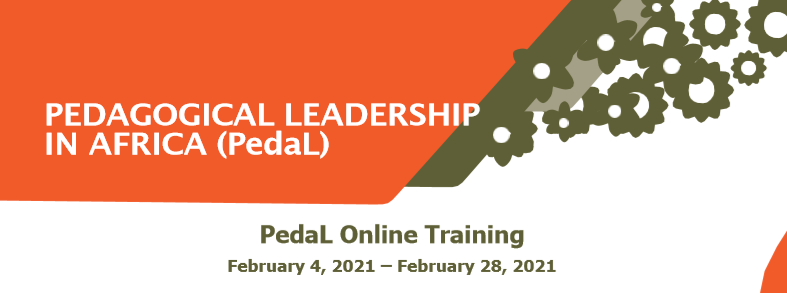
African academics will need to embrace blended and online teaching in their quest to transform pedagogy so as to meet the expectations of students and enhance the quality of teaching and learning, according to experts and key African higher education stakeholders.
The community of educators and leaders are drawn from 29 public and private universities in 5 African countries: Kenya, Uganda, Tanzania, Ghana and Nigeria said that the future of higher education on the continent is fast changing with advancements in technology. They also noted that technology is central in the life of students today and that facilitating technology-enhanced learning would serve the interests of students.
They were speaking this week (8th February) during a live session of technology for transformative pedagogy in Africa training under the Partnership for Pedagogical Leadership in Africa (PedaL) initiative.
The training is the fifth of a series of PedaL’s online training programme that seeks to help university educators enrich their knowledge in the design of courses and how to utilize technologically driven learning management systems to enhance teaching and learning. PedaL training participants cover fundamental concepts and practical application of a variety of toolsets, digital resources and strategies for course planning and design as well as creative facilitation and innovative assessment. The initiative is implemented by Partnership for African Social Governance Research (PASGR) in partnership with African Research Universities Alliance, the UK’s Institute of Development Studies, the University of Sussex, Nigeria’s University of Ibadan, the University of Ghana, Uganda Martyrs University, Tanzania’s University of Dar es Salaam and Egerton University in Kenya with funding from the Strategic Partnerships for Higher Education Innovation and Reform (SPHEIR) programme. SPHEIR is managed on behalf of the UK Foreign, Commonwealth and Development Office by a consortium that includes PwC and Universities UK International.
“It is our responsibility to mould and bring out the best in our students. With PedaL, we are opening a world full of possibilities for transforming our teaching and learning strategies” said Dr. Beatrice Muganda, PASGR’s acting executive director as she gave her welcoming remarks.
Muganda who is also the director of higher education at PASGR said that the PedaL programme had already trained over 1400 academics in 70 universities spread across 10 African countries. She stressed that PedaL promotes co-creation of knowledge, and inclusivity, giving voice even to the marginalized in Africa’s higher education ecosystem to drive pedagogical transformation. “Unless pedagogical transformation happens to academics, it cannot happen to students. We need a holistic digital transformation of all processes in our institutions as this is the future of universities,” said Professor Robert Gateru, Vice-Chancellor of Riara University in Kenya.
Gateru who has undertaken the PedaL Online training himself, his Vice-Chancellor status notwithstanding, is a visionary leader. He challenged African academics to embrace blended and online teaching and learning as this will define the future of higher education globally.
“Majority of our students today prefer blended learning. We should go where learners are and give them what they want,” added Gateru.
Professor Jonathan Babalola, Provost, Postgraduate College at Nigeria’s University of Ibadan said that lauded PedaL training and urged university educators to focus learning on the competencies they expect the students to develop and demonstrate in the community and at work.
Egerton University’s deputy vice-chancellor academic affairs, Professor Alexander Kahi said that technological transformative pedagogy as advanced by PedaL will enhance the sustainability of higher education in Africa. He further applauded the efforts made by PedaL to support African universities to adopt innovative pedagogies. “This is a very important step we are making towards quality education for future generations”, stressed Professor Kahi.
“PedaL is extremely relevant to the context in which we work because it stimulates ownership with the conversation moving away from the facilitator to the participants. It also promotes peer learning through experiences shared,” said Prof. Betty Ezati, Dean School of Education, Makerere University, Uganda while sharing her the story of her compelling PedaL journey.
“The immediacy of the use of the content is profound; whatever you learn, you put it to use immediately. Coming out of the course, you have a reviewed course or created a new course ready to be delivered online,” she added.
Prof. Samuel Agyei-Mensah, Director, Centre for Teaching and Learning Innovation, University of Ghana, Ghana said that PedaL is an eye-opener due to its captivating innovative methods of teaching and learning. He added that; “PedaL programme managers at the University of Ghana and I were able to have a discuss and deliver a training programme that equips lecturers of the University of Ghana with innovative pedagogical skills aimed at enhancing student learning outcomes”.
Inspired by PedaL the University of Ghana established the Centre for Teaching and Learning Innovation in 2020. The Center is supported by funding from The Carnegie Mellon Foundation.
Prof. Labode Popoola, Vice-Chancellor, Osun State University, Nigeria observed that; “PedaL is proof to the limitless possibilities of human creativity. It is a programme that has brought lecturers from different institutions in different countries together to bring a breath of fresh air in an area that has been neglected for a long time. It is an opportunity to be relevant and one should not miss it!” He noted that the Osun State University was pleased to be a legitimate member of the PedaL partnership.
The opening ceremony marked the fifth series of PedaL Online training and another significant landmark in the landscape of pedagogical transformation on the continent. As the year unfolds, the growth and impact of PedaL will be closely watched.